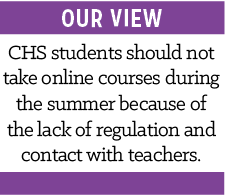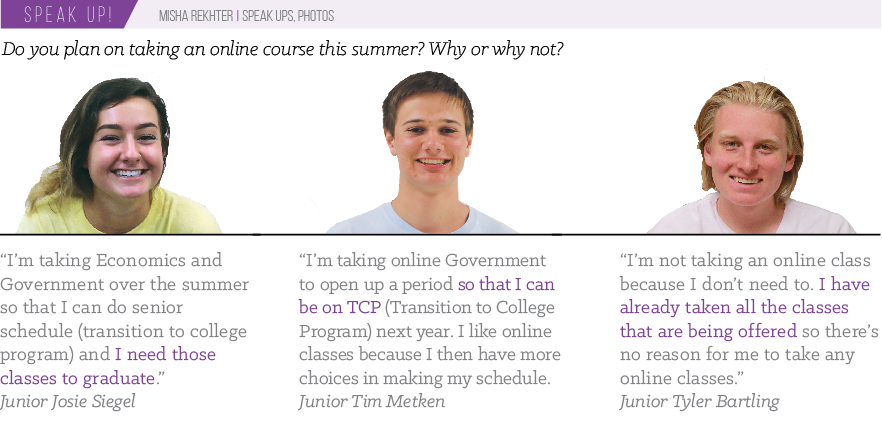In  light of the addition of AP Government as an online course this summer, many students have been eagerly seizing the opportunity to add the class to their schedule. The combination of a flexible schedule, a full-weight credit and the ability to work from the comfort of one’s own home seems to make for an ideal scenario. However, there are other aspects one must consider when enrolling in a digital classroom. Although online courses offer a quick and convenient way to earn credit hours, they also present several potential setbacks to one’s learning.
light of the addition of AP Government as an online course this summer, many students have been eagerly seizing the opportunity to add the class to their schedule. The combination of a flexible schedule, a full-weight credit and the ability to work from the comfort of one’s own home seems to make for an ideal scenario. However, there are other aspects one must consider when enrolling in a digital classroom. Although online courses offer a quick and convenient way to earn credit hours, they also present several potential setbacks to one’s learning.
For one, the absence of a traditional classroom environment stunts interaction with not only the teacher but also one’s peers. In most online courses, instructors maintain limited to nonexistent contact with students rather than actually teaching the course material and ensuring complete understanding of the topic. In fact, the majority of teachers rely on outside sources to guide students in what is essentially self-studying.

Furthermore, many online instructors simply provide outside reading materials to students to self-study instead of creating detailed lesson plans with scheduled progress checks. Specifically, Indiana Online Academy (IOA) has a 20-percent-complete deadline for their online courses but has very little regulation for the remainder of the coursework regarding time and pace.
Lack of regulation also leads to another issue with online schooling: cheating. Currently, IOA has imposed restrictions designed to prevent cheating upon only the final exam. But for any other quiz or test within the course, students can easily use another student’s answers or even search up answers in another tab. While in the moment this may seem a convenient and easy path to a high grade, in the long run it means students can find themselves unable to retain the information from the class. In particular, students who plan on taking the AP exam for online courses taken during the summer may have to essentially re-learn the entire course come May.
We understand the appeal of the “easy A” seemingly guaranteed by online classrooms, as well as the convenience and flexibility they offer. However, we still believe students should be weary when enrolling in such courses, and truly consider the implications upon their own education before foregoing in-class instruction.

































![AI in films like "The Brutalist" is convenient, but shouldn’t take priority [opinion]](https://hilite.org/wp-content/uploads/2025/02/catherine-cover-1200x471.jpg)










































![Review: “The Immortal Soul Salvage Yard:” A criminally underrated poetry collection [MUSE]](https://hilite.org/wp-content/uploads/2025/03/71cju6TvqmL._AC_UF10001000_QL80_.jpg)
![Review: "Dog Man" is Unapologetically Chaotic [MUSE]](https://hilite.org/wp-content/uploads/2025/03/dogman-1200x700.jpg)
![Review: "Ne Zha 2": The WeChat family reunion I didn’t know I needed [MUSE]](https://hilite.org/wp-content/uploads/2025/03/unnamed-4.png)
![Review in Print: Maripaz Villar brings a delightfully unique style to the world of WEBTOON [MUSE]](https://hilite.org/wp-content/uploads/2023/12/maripazcover-1200x960.jpg)
![Review: “The Sword of Kaigen” is a masterpiece [MUSE]](https://hilite.org/wp-content/uploads/2023/11/Screenshot-2023-11-26-201051.png)
![Review: Gateron Oil Kings, great linear switches, okay price [MUSE]](https://hilite.org/wp-content/uploads/2023/11/Screenshot-2023-11-26-200553.png)
![Review: “A Haunting in Venice” is a significant improvement from other Agatha Christie adaptations [MUSE]](https://hilite.org/wp-content/uploads/2023/11/e7ee2938a6d422669771bce6d8088521.jpg)
![Review: A Thanksgiving story from elementary school, still just as interesting [MUSE]](https://hilite.org/wp-content/uploads/2023/11/Screenshot-2023-11-26-195514-987x1200.png)
![Review: "When I Fly Towards You", cute, uplifting youth drama [MUSE]](https://hilite.org/wp-content/uploads/2023/09/When-I-Fly-Towards-You-Chinese-drama.png)
![Postcards from Muse: Hawaii Travel Diary [MUSE]](https://hilite.org/wp-content/uploads/2023/09/My-project-1-1200x1200.jpg)
![Review: "Ladybug & Cat Noir: The Movie," departure from original show [MUSE]](https://hilite.org/wp-content/uploads/2023/09/Ladybug__Cat_Noir_-_The_Movie_poster.jpg)
![Review in Print: "Hidden Love" is the cute, uplifting drama everyone needs [MUSE]](https://hilite.org/wp-content/uploads/2023/09/hiddenlovecover-e1693597208225-1030x1200.png)
![Review in Print: "Heartstopper" is the heartwarming queer romance we all need [MUSE]](https://hilite.org/wp-content/uploads/2023/08/museheartstoppercover-1200x654.png)




